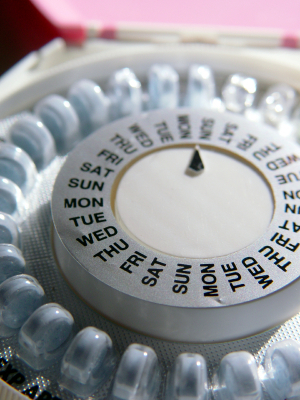Are Your Birth Control Pills Making You Depressed?
A new study was recently published in JAMA Psychiatry on the link between hormonal contraception and depression. The study concluded that the use of hormonal contraception – including birth control pills, implants and patches – especially among adolescents, was associated with subsequent use of antidepressants and a first diagnosis of depression, suggesting depression as a potential side effect of hormonal contraceptive use.
What Birth Control Pills Do To Your Hormones
Hormonal contraceptives are prescription drugs or devices that reduce risk of pregnancy. Birth control pills, the option most widely used by women, contain the synthetic hormones estrogen and progestin, and some contain only progestin. They are created to stop your body from ovulating and prevent the egg from being released from the ovary, which negatively affect hormone balance.
Normally, when an egg is released from your ovary at ovulation, progesterone is also released. Since birth control pills stop you from ovulating, they prevent this release of progesterone. This is where the problem lies.
Progestins are NOT Progesterone
Before we go any further, it’s important to make the distinction between progestin and progesterone. They are not the same thing, at all. Progesterone is the natural female hormone that promotes pregnancy by preparing the body for conception, regulating the menstrual cycle and maintaining the pregnancy. It also balances the estrogen in your body and plays an important role in your overall well-being.
Progestins are synthetic chemicals with a different molecular structure than progesterone, which makes them patentable by the pharmaceutical companies, but they do not have the same beneficial effects as your body’s naturally occurring progesterone. In fact, progestins are used in hormonal contraceptives and in the “morning after pills” to prevent pregnancy.
Mainstream medicine still erroneously uses these two terms interchangeably today. If you’re still in doubt, just ask your doctor if you can take progestin while you’re pregnant. You’ll hear a resounding “no”!
Progesterone’s Positive Effect on Mood
Progesterone has a calming effect on the brain. It stimulates the brain’s GABA receptors, the feel-good, calming neurotransmitters. When your progesterone levels decline, you feel down and moody. Did you ever notice how some women say how good they felt during their pregnancy? That’s because of the high levels of progesterone being produced by the placenta. After childbirth, the drop in progesterone is what causes the low moods of postpartum depression.
Side Effects of Birth Control Pills
It’s important to note that by taking birth control pills, you are doing more than just affecting your moods. Take a look at some of the common side effects:
Increased risk of breast cancer Increased risk of cervical cancer
Blood clots High blood pressure
Increased arterial plaque Heart Attack and stroke risk
Headaches Migraines
Bloating Breast tenderness
Vaginal infections Candida/yeast overgrowth
Gall bladder disease Depression/mood changes
Weight gain Headaches
Irregular periods Mood changes
Decreased sexual desire Acne
Nausea Abdominal pain
Intermenstrual spotting Chest pain
Headaches Eye problems (blurred vision)
Swelling or aching in the legs and thighs Missed periods
Vaginal discharge Lower bone density
Low Progesterone is a Common Cause of PMS and Irregular Periods
If you are taking birth control pills to relieve symptoms of PMS or to regulate your periods, there is a better, safer way. Often the reason you are having symptoms is due to an imbalance of progesterone and estrogen, when you are low in progesterone.
Other Symptoms of Low Progesterone
Mood swings Panic attacks
Low libido Anxiety
Weight gain PMS
Irregular menstrual cycles Uterine fibroids
Heavy periods without clotting Endometriosis
Premenstrual breast tenderness Menstrual cramps
Fluid retention Depression
Migraines
Progesterone is also a protective hormone when it comes to preventing cancer.
Hormone Deficiency Causes Depression
This study only reinforces what we know to be true – a decline in hormones can cause depressed moods. Low progesterone leads to many of the symptoms that cause a woman to go on birth control pills in the first place, so why not replace what is really missing? Common sense would dictate that replacing those lost hormones with the same identical hormones, not a different chemical compound such as antidepressants or progestins, would relieve the depression and bring your body back into balance naturally, and safely.
Related Content
Christine’s Story – Side Effects of Birth Control Pills
6 Ways Hormones Affect Your Mental Health
Antidepressants for PMS? Think Again!


Allison M Brandt
I stopped using progesterone when my hair started to thin and fall out. Is this a side effect of progesterone?
If so, would 1 capsule be less harmful?I was taking 3-4 a day as prescribed and my mood was better but I don’t want to lose my hair. What do you suggest?
Hotze Team
Dear Allison,
Thank you for your questions – hair loss can be a frustrating experience. If you are referring to the progestins in birth control pills, then yes, that can cause hair loss. However, please note that progestins are not the same as progesterone. Also, we find that hypothyroidism is a common cause of hair loss. This article by one of our providers will be of help to you: http://makeshift-worm.flywheelsites.com/2016/10/getting-to-the-root-of-hair-loss/
Please take our symptom checker quiz to find out if you might have symptoms of hypothyroidism and other hormone imbalances: http://makeshift-worm.flywheelsites.com/symptom-checker/ This can help you to know what you are dealing with so that you can find the root cause and get the right help.
If we may be of service to you, please do not hesitate to call our wellness consultants at 281-698-8698.
Sincerely,
Hotze Team